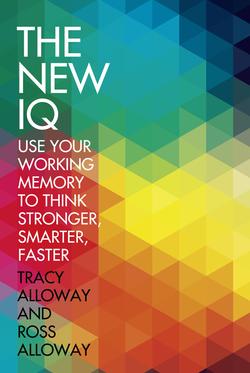Читать книгу The New IQ: Use Your Working Memory to Think Stronger, Smarter, Faster - Tracy Alloway - Страница 66
Оглавление5
The Most Important Learning Tool
Working Memory in School
IQ SCORES HAVE LONG been held as the benchmark for academic success. But in our own research, we found that relying on IQ to predict success is flawed.
When Tracy began investigating working memory, IQ, and academic achievement, she wanted to find out which cognitive skills were most important in predicting a child’s success in school. For one of her first published studies, she recruited almost two hundred kindergartners and gave them a variety of tests, including working memory and IQ tests. When she compared their scores on these tests with their grades, she was taken aback by the results.
The students’ IQ scores were surprisingly inaccurate in determining how well they would do in school, contrary to what you might think. According to her findings, students can have an average IQ score but perform poorly in school. For example, one of the kindergartners in this study, Andrew, had an average IQ score, but by the time he reached second grade, he was struggling to keep up with his classmates. If IQ was a good predictor of success, then Andrew shouldn’t have had such a tough time in school. His IQ wasn’t the reason he was doing poorly.
When Tracy looked at Andrew’s working memory score, she noticed that it was low compared to his peers. In fact, if you stood him in a line of one hundred children of the same age, Andrew would be at the end of that line when it came to his working memory skills. Andrew’s poor working memory score correlated to his poor performance in school.
The same held true for the other kindergartners. Tracy found that working memory could predict what grade students would get with far greater accuracy than IQ. In fact, if Tracy knew a child’s working memory, she could determine his or her academic skills with 95 percent accuracy. When we looked at the youngsters’ grades six years later, we found that working memory had such a powerful impact on learning that by knowing their working memory in kindergarten, we could also predict with 95 percent accuracy what their grades would be in the sixth grade.
In another study, Tracy wanted to identify the key cognitive skill required for success in learning the most basic school subjects: reading, comprehension, spelling, and math. She tracked nearly seventy students aged seven to eleven for two years. She tested their working memory and IQ and then compared those scores with their academic achievement in these four subjects. When she analyzed the data and compared working memory to IQ, she once again found that IQ contributed very little to achievement. On the other hand, working memory was the most important cognitive skill, and a strong working memory meant strong grades.
Other research groups have also reported this exciting finding of how working memory skills lay the foundation for school success. Linda Siegel, the Chair in Special Education at the University of British Columbia, Canada, has published several key pieces of research highlighting the importance of working memory in learning. In one study with seven- to thirteen-year-olds, she found that poor working memory can result in reading problems, as well as difficulty with arithmetic and computation.
British psychologist Rebecca Bull echoed this finding with British students and found that if students have poor working memory, they have lower mathematical ability because they are not able to process and work with all the necessary numerical information. Their poor working memory skills also mean that they find it difficult to integrate different mathematical concepts, something that is commonly required in solving word problems.
In the United States, psychologist David Geary at the University of Missouri–Columbia has spent nearly a decade investigating the importance of working memory in math skills. In one of his many studies, he followed children from kindergarten to fifth grade and found that those who struggled most in math had lower working memory scores compared to their schoolmates.
A wealth of research also points to working memory as the most important cognitive skill in language acquisition. Researchers from the University of California studied high school students over three years and identified working memory as the key skill that determined success in reading and comprehension. Adding to these findings are numerous studies from Susan Ellis Weismer and her colleagues at the University of Wisconsin–Madison. Weismer’s work shows that working memory is critical for learning grammar as well as new vocabulary words. In her studies, the students typically have average IQ skills but poor working memory, so they offer an ideal opportunity to disentangle the contribution of working memory to learning from what IQ can offer.
Weismer has reported that even if students have average IQ skills, their poor working memory makes it hard to learn new words and remember the grammatical rules. In particular, she has found that people with average IQ but poor working memory have more difficulty learning if the information is presented quickly.
Tracy’s contributions to the growing body of evidence on working memory and learning skills include another study in which she compared the IQ and working memory scores in six- to eleven-year-olds. In this study, she found a causal relationship between working memory and language (reading, writing, and comprehension) and math skills. The strength of the children’s working memory determined how well they would do in these subjects.
With the evidence from Tracy and other researchers mounting, it has become crystal clear: if we want to know how well students will perform in the classroom, we need to look at their working memory.
